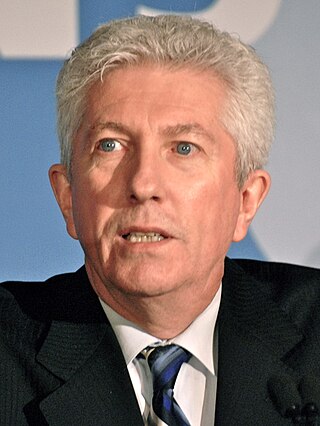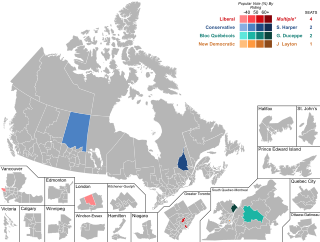
The Bloc Québécois is a federal political party in Canada devoted to Quebec nationalism and the promotion of Quebec sovereignty. The Bloc was formed by Members of Parliament (MPs) who defected from the federal Progressive Conservative Party and Liberal Party during the collapse of the Meech Lake Accord. Founder Lucien Bouchard had been a cabinet minister in the federal Progressive Conservative government of Brian Mulroney.

Gilles Duceppe is a retired Canadian politician, proponent of the Quebec sovereignty movement and former leader of the Bloc Québécois. He was a Member of Parliament in the House of Commons of Canada for over 20 years and was the leader of the sovereigntist Bloc Québécois for 15 years in three stints: 1996, 1997-2011 and in 2015. He was Leader of the Official Opposition in the Parliament of Canada from March 17, 1997, to June 1, 1997. He resigned as party leader after the 2011 election, in which he lost his own seat to New Democratic Party (NDP) candidate Hélène Laverdière and his party suffered a heavy defeat; however, he returned four years later to lead the party into the 2015 election. After being defeated in his own riding by Laverdière again, he resigned once more.

The 1993 Canadian federal election was held on October 25, 1993, to elect members to the House of Commons of the 35th Parliament of Canada. Considered to be a major political realignment, it was one of the most eventful elections in Canada's history. Two new regionalist parties emerged, finishing second and third in seat count. Most notably, the election marked the worst defeat for a governing party at the federal level and the worst ever suffered by a governing party in the Western democratic world. In a landslide, the Liberal Party, led by Jean Chrétien, won a majority government.

The 2004 Canadian federal election was held on June 28, 2004, to elect members to the House of Commons of Canada of the 38th Parliament of Canada. The Liberal government of Prime Minister Paul Martin lost its majority but was able to continue in office as a minority government after the election. This was the first election contested by the newly amalgamated Conservative Party of Canada, after it was formed by the two right-of-centre parties, the Progressive Conservative Party and the Canadian Alliance.

The 35th Canadian Parliament was in session from January 17, 1994, until April 27, 1997. The membership was set by the 1993 federal election on October 25, 1993, and it changed only somewhat due to resignations and by-elections until it was dissolved prior to the 1997 election.

Françoise Boivin is a Canadian politician, who represented the electoral district of Gatineau in the House of Commons of Canada until 2015.

The 2006 Canadian federal election was held on January 23, 2006, to elect members to the House of Commons of Canada of the 39th Parliament of Canada.

The 39th Canadian Parliament was in session from April 3, 2006 until September 7, 2008. The membership was set by the 2006 federal election on January 23, 2006, and it changed only somewhat due to resignations and by-elections. The Parliament was dissolved on September 7, 2008, with an election to determine the membership of the 40th Parliament occurring on October 14, 2008.

Maria Mourani is a Canadian politician who was elected as a Member of Parliament in the federal riding of Ahuntsic in Canada. She was formerly a member of the Bloc Québécois before leaving the party over its support for the proposed Quebec Charter of Values. She joined the New Democratic Party in November 2014 but was not a member of the party's caucus due to the party's policy against crossing the floor; she stood for the NDP in the 2015 Canadian federal election, but did not win. Mourani was the first woman of Lebanese origin elected to the Canadian House of Commons. In 2017, she became the Quebec representative in the Permanent Delegation of Canada at UNESCO.

The 39th Canadian federal election was held on January 23, 2006.

The 2008 Canadian federal election was held on October 14, 2008, to elect members to the House of Commons of Canada of the 40th Canadian Parliament after the previous parliament had been dissolved by Governor General Michaëlle Jean on September 7, 2008.

The 40th Canadian Parliament was in session from November 18, 2008 to March 26, 2011. It was the last Parliament of the longest-running minority government in Canadian history that began with the previous Parliament. The membership of its House of Commons was determined by the results of the 2008 federal election held on October 14, 2008. Its first session was then prorogued by the Governor General on December 4, 2008, at the request of Prime Minister Stephen Harper, who was facing a likely no-confidence motion and a coalition agreement between the Liberal party and the New Democratic Party with the support of the Bloc Québécois. Of the 308 MPs elected at the October 14, 2008 general election, 64 were new to Parliament and three sat in Parliaments previous to the 39th: John Duncan, Jack Harris and Roger Pomerleau.

The 2008 Canadian federal election was held on Tuesday, October 14, 2008 to elect members to the House of Commons of Canada of the 40th Canadian Parliament after the previous parliament had been dissolved by the Governor General on September 7, 2008. The election yielded a minority government under the Conservative Party of Canada, led by the incumbent Prime Minister, Stephen Harper.

The 40th Canadian federal election was held on October 14, 2008.
The 40th Canadian Parliament contained a record number of female Members of Parliament, with 69 women elected to the House of Commons of Canada in the 2008 federal election. However, this represented just 22 per cent of the 308 total MPs, and only a modest gain over the 65 women in the 39th Canadian Parliament.

Yves-François Blanchet is a Canadian politician who has led the Bloc Québécois (BQ) since 2019. He has been the Member of Parliament (MP) for Beloeil—Chambly since the 2019 federal election.
By-elections to the 37th Canadian Parliament were held to fill vacancies in the House of Commons of Canada between the 2000 federal election and the 2004 federal election. The Liberal Party of Canada led a majority government for the entirety of the 37th Canadian Parliament, with little change from by-elections.

The 41st Canadian federal election was held on May 2, 2011. It resulted in a Conservative majority government under the leadership of Prime Minister Stephen Harper. It was the third consecutive election win for Harper, and with 166 of 308 seats, giving them a majority government for the first time in their eight-year history. It was also the first right-of-centre majority government since the Progressive Conservatives won their last majority in 1988. The Conservative Party won 39.62% of the popular vote, an increase of 1.96%, and posted a net gain of 24 seats in the House of Commons.

By-elections to the 39th Canadian Parliament were held to fill vacancies in the House of Commons of Canada between the 2006 federal election and the 2008 federal election. The Conservative Party of Canada led a minority government for the entirety of the 39th Canadian Parliament, although their seat total increased as a result of by-election results.
Mylène Freeman is a former Canadian politician who was the New Democratic Party (NDP) Member of Parliament for the riding of Argenteuil—Papineau—Mirabel in Quebec. She was elected in the 2011 Canadian federal election after defeating incumbent Mario Laframboise of the Bloc Québécois.